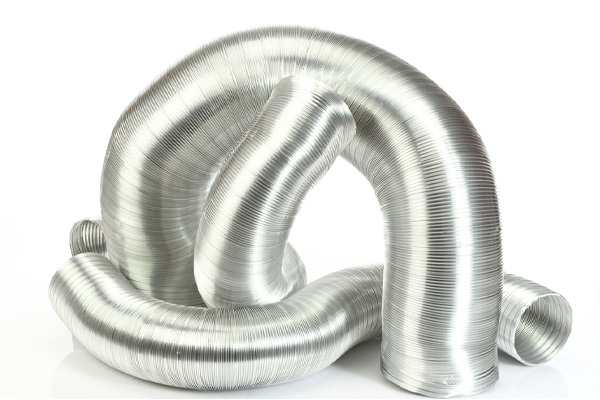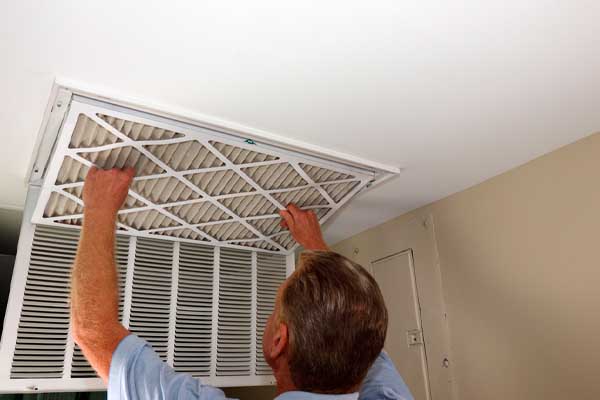Ductwork Makes Banging Noise: Causes & Solutions

Forced-air HVAC systems produce cool or warm air in one area of the home and then circulate it via a network of ducts. The ductwork is typically made of metal which is susceptible to making noise even at the slightest disturbance. Ductwork noise can get annoying, especially if it is loud and frequent. Homeowners may not be able to sleep soundly as well. This article discusses some of the common causes of ductwork noise. We also share some strategies to reduce it.
Possible Reasons Behind HVAC Ductwork Noise
Contents
HVAC ductwork may generate noise for one of several reasons. You should listen closely to listen to the type of sound it produces. What you hear can give you an idea of the cause of the issue, even if you can’t see it. One of the most common sounds we face is the HVAC ductwork making a banging noise.
Ductwork Is Banging
According to some homeowners, they hear popping and banging sounds coming from their ducts. These noises typically happen in short bursts. The walls of the duct expand and contract when the internal temperatures change. Pressure fluctuations may also trigger this noise. Keep in mind that hot air can cause the ducts to expand while cold air causes them to contract. The human eye may not be able to discern them, but you can hear them happening after switching on your air conditioner or furnace.
Causes For Other Types Of Ductwork Noises
The ducts can also emit various noises aside from popping and banging. Here are several common sounds and the reason behind them:
Rattling Ductwork

If your air ducts are rattling, loose metal parts are the likely culprits. They knock against one another and make noise, which tends to occur as the ductwork ages. The seals start failing, and there will be loose connections because of static pressure. The sound will be heard while the air is passing through the ducts. You may initially hear a soft sound, but it will eventually get louder until you cannot ignore the noise anymore. Hire an HVAC professional to find and repair the issue.
Related Article: Signs Your HVAC Air Ducts Are Leaking
Booming HVAC Ductwork
This loud noise may be heard at the connection of the ductwork’s trunk and plenum. This area has the biggest swing in temperature. If the connection has insufficient quantities of expansion joints or dampers, the noise will be heard throughout the house via the supply ducts. Experienced and skilled HVAC professionals are aware of this, so they do all they can to reduce the noise when installing the ductwork.
HVAC Ductwork Is Shaking
At times, you may see the ducts shaking or hear a low vibrating sound coming from it. This usually happens when a dirty air filter blocks the airflow from the return side. As the air cannot pass through, there will be a significant drop in pressure that can cause the duct walls to shake and vibrate. Therefore, you should habitually check your air filters and clean or replace them regularly. This way, the ducts operate more quietly, and the system can operate efficiently.
Scratching Ductwork

Another unwelcome sound from the air ducts is when you hear a scratching noise from its metal walls. It is likely that creatures such as raccoons, rats, and squirrels have entered your system and are making this sound. You should do something about it right away to prevent them from forming a nest in the ducts. This will have a negative impact on your air quality. If you hear a buzzing sound, it may be caused by the wings of bees or other large insects inside the duct. Contact an HVAC technician to help you.
Related Article: What To Do If A Rodent Dies In Your Ductwork
How to Reduce HVAC Ductwork Noise
Homeowners shouldn’t have to endure the noise forever. You can remove foreign objects or creatures from the ducts. Qualified HVAC contractors can repair problem areas. If the system’s normal operation causes the noise, the volume of the noise can be reduced. This way, the sound is bearable for homeowners who wish to have a quiet home. Here are several solutions that can be done to help make this happen:
Adjust The Fan Speed
HVAC installers configure the airflow volume from the start. Each system has an optimum range which can be accounted for using several factors. The speed is set up too high in many cases. If this happens in your home, you can lower the fan speed, so there is less static pressure. You can also ask for help from an HVAC professional, as setting the fan speed too low can mean that the conditioned air will have difficulty reaching some rooms.
Change the Air Filters

Keep an eye on the air filters. These components trap dirt while letting air pass through. The filters catch more dirt as time passes, making it harder for the air to breach the barrier. Therefore, the air filters should be replaced every two to three months, so there is proper airflow and efficiency. If you have pets at home or live in dusty areas, you may need to replace the filters monthly. How often you need to conduct filter replacements depends on your home’s unique situation. A clean filter prevents popping and banging noises from the ducts. Air filters are pretty cheap, so change them immediately so your HVAC system can operate better.
Related Article: 7 Reasons Your Filter Isn’t Improving Your Indoor Air Quality
Install Larger Ducts
There is also a chance that the ducts are too small for the air volume your system needs to operate well. The HVAC units may be correctly sized, but undersized ducts can still create problems. Consult your HVAC contractor so they can assess the situation. Larger ducts and a larger return and supply plenum help lessen the noise. Match them with high-velocity grills and registers to have better airflow.
Add a Bypass Duct
Use a bypass duct to lower the pressure if there is a lot in your multi-zone system. Reducing the pressure is an excellent method to get rid of the excess stress on the ductwork and keep common issues at bay. However, it will only be effective in some cases. Talk to HVAC experts to see if this option is a good match for your ductwork.
Try a Different Duct Shape
Consider the shape if you need to install new ducts. The rectangular ducts are popular due to their clean lines and slim profile. However, they are likely to generate more noise compared to round ones because they have lower pressure tolerance. If round ducts fit in your home, they may be worth looking at. Consult your local, trusted HVAC company to help you.
Use a Duct Silencer
Round ducts can be installed with duct mufflers so the noise they generate is further reduced. Duct silencers are designed with double walls and insulation to dampen vibrations. These work best when placed near components that make the most noise, like the fan and air handling unit. Keep in mind that these can only lessen unwanted noises and cannot eliminate them completely.
Insulate the Ducts
The ducts can be wrapped with insulation to enhance energy efficiency. They also help keep the noise down, especially the banging and popping noises. Hire a certified HVAC professional to do this task to get the best results.
Switch to a Ductless System
If you did all the noise reduction strategies listed in this article but are still unsatisfied, consider moving away from ducts completely. A ductless mini-split system offers heating and cooling without needing ductwork, so you become free from ductwork noise and upkeep. A ductless heating and cooling system also come with benefits like creating multiple zones, higher energy efficiency, and independent temperature control.
Conclusion
Lots of factors can cause noise in your ductwork. It can sometimes be due to an underlying problem, including loose connections, pest infestation, and incorrect system configuration. When these issues happen, the noise is an excellent way for the homeowner to know that there’s a problem requiring attention. The noise may also be part of your system’s regular operation. It may not go away, but several strategies can reduce the noise’s frequency and loudness. Talk to your local, trusted HVAC technician to determine the best solutions for your home and system.
Call Point Bay Fuel For All Of Your HVAC Requirements

Point Bay Fuel provides high-quality HVAC services in Ocean and Monmouth County, New Jersey. We employ the best professionally certified technicians to conduct all your heating and cooling service needs, including furnace replacements, air conditioner tune-ups, boiler installations, and more. Each of our techs has the right tools, years of experience, and extensive knowledge to service your HVAC system correctly and on time. Click the link to view our service area.
When you need the most competitive cooling and heating rates in the area, don’t hesitate to call Point Bay Fuel. Our maintenance services can help you achieve better home comfort and improved energy efficiency while reducing your heating and cooling expenses. If you need an HVAC repair or replacement system, we can provide you with the most suitable solution for your home while staying within your budget. All of our work is guaranteed because your satisfaction is important to us. Be sure to call Point Bay Fuel to schedule a service appointment today and receive a free, in-home estimate.
Contact us now by calling (732) 349-5059 to speak to one of our home comfort specialists!
